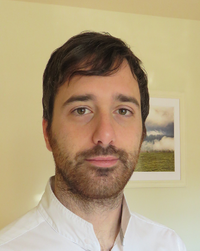FLuTE and G2TRC warmly invites you to attend their joint seminar on the 12 February at 13:00.
Refreshments will be provided on arrival.
Two-phase fluid systems: Synergistic use of theory, simulations and experiments
Guest speaker: Mirco Magnini, Dept. of Chem. Eng, Imperial College London

Dr Mirco Magnini
Abstract:
In recent years, we are observing rapid advances on the reliability and accuracy of both commercial and in-house two-phase numerical codes, which show capability to simulate rather complex dynamics of fluids interfaces. Volume-Of-Fluid, Level-Set, Front-Tracking, mixed Lagrangian-Eulerian, Phase-Field, Lattice-Boltzmann, Molecular Dynamics, are just a few of the heterogeneous approaches that are nowadays recognized as promising strategies for the numerical simulation of multiphase flows.
However, the validation of two-phase numerical codes versus experimental data still represents a difficult aspect. Numericists often attempt validation versus experimental data from the literature, without sufficient information about the way the flow was generated; furthermore, detailed spatio-temporally resolved measurements and flow visualization, a key ingredient for the validation of two-phase numerical codes, are still a rarity. Hence, the understanding of two-phase fluid systems would benefit from a better “handshake” between experimental and numerical specialists. The experimentalist should be aware of the advantages and limitations of the simulation tool utilized by the numerical “colleague”, while the numericist should know better how the experiment is set and how the physical flow looks like. This close collaboration would enable targeted experiments whose initial and boundary conditions are more easily reproducible by numerical simulations, thus leading to a better matching of test conditions, a coherent comparison of the results and an optimal benchmark of the numerical tool.
During my research into numerical and theoretical modelling of two-phase flows, I had the chance to work closely with experimental specialists in different joint projects and my talk will go through some selected studies which exemplify the beneficial outcome of these collaborations: (i) analysis of flow boiling within microchannels and successive development of physics-based heat transfer prediction methods (@EPFL) [1,2]; (ii) theoretical and experimental analysis of Taylor bubbles rising in vertical tubes (with Princeton University) [3]; (iii) joint study on removal of trapped water from low sections of oil transportation pipelines (with Tel Aviv University) [4]; multiscale analysis of nucleate boiling joining experiments, simulations and a coupled continuum-molecular scale code (@Imperial College). The talk will conclude with my vision for future joint experimental/numerical research on two-phase fluid dynamics and heat transfer at the University of Nottingham.
Bio:
Dr. M. Magnini is a post-doc research associate at Imperial College London. He received a M. Sc. degree in Mechanical Engineering in 2007 from Università di Bologna, Italy, and a Ph.D. degree in Energy Engineering in 2012 from the same institution. From 2013 to 2017, he
was a post-doc at the Laboratory of Heat and Mass Transfer (Prof. J. R. Thome), EPFL, Switzerland, where he also designed and taught the semester course “Numerical Methods in Heat Transfer”. In 2018, he joined the Department of Chemical Engineering (Prof. O. K. Matar) at Imperial College London. His research focuses on numerical simulations of two-phase flows with phase change within macro and microchannels, wax deposition, theoretical modelling of thin film dynamics and evaporation in microchannel flows. From April 2019, he will join the Gas Turbine and Transmission Research Centre (G2TRC) at the University of Nottingham.
References:
[1] M. Magnini, B. Pulvirenti, J. R. Thome, Numerical investigation of hydrodynamics and heat transfer of elongated bubbles during flow boiling in a microchannel, Int. J. Heat Mass Transfer 59 (2013) 451-471.
[2] M. Magnini, J. R. Thome, An updated three-zone heat transfer model for slug flow boiling in microchannels, Int. J. Multiphase Flow 91 (2017) 296-314.
[3] M. Magnini, S. Khodaparast, O. K. Matar, H. A. Stone, J. R. Thome, Dynamics of long gas bubbles rising in a vertical tube in a cocurrent liquid flow, Physical Review Fluids (2019), in press.
[4] M. Magnini, A. Ullmann, N. Brauner, J. R. Thome, Numerical study of water displacement from the elbow of an inclined oil pipeline, J. Petroleum Science & Engineering 166 (2018) 1000-1017.